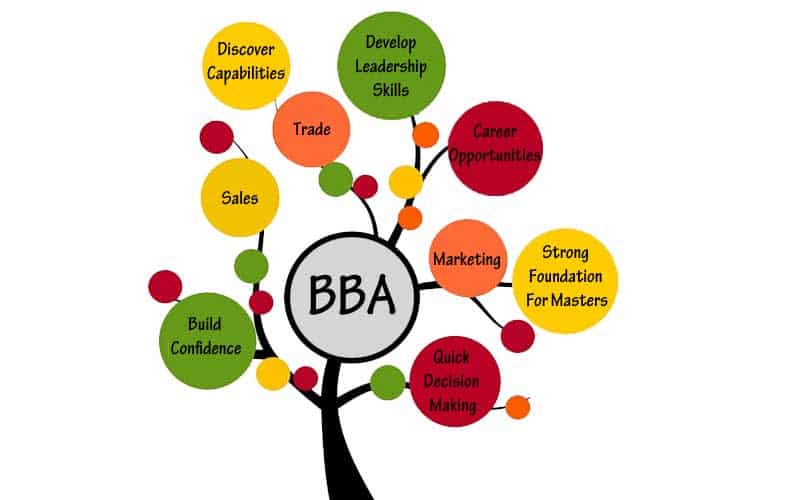 SIMT
SITASRM INSTITUTE OF MANAGEMENT & TECHNOLOGY
SIMT
SITASRM INSTITUTE OF MANAGEMENT & TECHNOLOGY
 SIMT
SITASRM INSTITUTE OF MANAGEMENT & TECHNOLOGY
SIMT
SITASRM INSTITUTE OF MANAGEMENT & TECHNOLOGY

SIMT
SITASRM INSTITUTE OF MANAGEMENT & TECHNOLOGY
Menu
Understanding Core Leadership Skills Required for Your MBA Journey

What does it take to become a successful leader today? Do you have to make tough decisions, inspire teams, or adapt to a fast-changing environment? When starting an MBA program, these questions become crucially important.
Leadership skills cannot be considered extra—they become necessary in working through complexity and getting ahead of other applicants. Leadership involves not only handling complex business situations, managing teams, or preparing for executive positions.
While on your MBA program, developing and polishing those skills will set you apart from your classmates and put you in the best position for long-term success. This blog-post lists the five leadership skills you will need to learn during your MBA program that will improve your learning and better equip you for a dynamic and ever-changing corporate landscape.
Top 5 Leadership Skills to Ace Today
-
Communication Skills
Leadership's CornerstoneThe heart of successful leadership is good communication. During your MBA studies, you will have to express ideas and convince others, which will influence your interactions with professors, classmates, and industry people.
But ever wondered why everyone insists on having good communication skills? Lets see why:
-
Clear decision-making- Open dialogue and sharing of information will support better decision-making through communication.
-
Collaboration- Proper communication helps to encourage teamwork, which then provides a good environment.
-
Executive Presence-The ability to present ideas with confidence will improve leadership standing in the meetings and presentations. Practice speaking to an audience. Make some presentations and run some seminars. Practice the skill of active listening in order to be aware of other viewpoints. Keep the reports, case studies, and proposals clear and concise.
-
Emotional Intelligence
Leading with Empathy Emotional intelligence (EQ) describes the ability to comprehend and manage one's own emotions, as well as those of others. It helps leaders manage different types of people and provides a healthy climate for the workplace.
Why Emotional Intelligence is Important?
Conflict is resolved well with the understanding of emotions because of easy conflicts amicably. Trust builds with the help of empathy and self-awareness among colleagues and subordinates. With an emotional intelligent leader, changes happen with resilience and composure.
How to Develop Emotional Intelligence?
Practice self-awareness by reflecting regularly and doing some mindfulness exercises. Be able to empathize by putting in the shoes of others and trying to understand their perspectives. Keep stress and emotions in check by having some balance in working habits.
The key tips to build emotional intelligence
-
Practice self-awareness by reflection and mindfulness exercises
-
Develop empathy by trying to understand the perspectives of others,
-
Practice the balancing work of stress and emotion.
-
Strategic Thinking
Creating a Vision for the Future in an MBA program, you will analyze complex problems and formulate strategic solutions. Strategic thinking is about seeing the bigger picture and grasping the specific details that dictate decisions.
Strategic Thinking-What is it?
It allows the making of informed, data-driven, and forward-thinking decisions by leaders. Innovation is identified by strategic thinkers, while anticipating market trends grants one a competitive advantage.
How to Cultivate Strategic Thinking?
Case study analysis provides understanding into real-world business challenges, strategic planning exercises with group discussions, staying updated on industry trends through research and networking.
-
Adaptability- thriving in a Changing Environment
The business world never stands still; so, only the best leaders will survive. Adaptability is the key to the relevance and innovation when dealing with technological disruption or market shifts. Why Adaptability is Crucial Resilience: Resilient leaders are able to rebound from misfortune and stay focused. Innovation: Flexibility is good for creative problem-solving and innovative thinking. Global Mindset: Adaptability is the ability to operate effectively across cultures and regions.
Ways to Improve Adaptability: Accept change and search for new learning opportunities, keeping a flexible mind and approach to solving problems. Get involved in projects where team members are from different functions to get some exposure to other business areas.
-
Decision-Making Skills
Effective leaders are those who can make the best decisions with limited information and under pressure. Within the MBA, there will be hundreds of situations that require you to make split-second yet informed choices.
Why Decision-Making Skills Make a Difference Efficient?
-
Quick Decision-making: It helps avert bottlenecks and allow for smooth operational flow.
-
Risk Control: Good decision-making abilities will pinpoint risks and help in conjoined ways of risk mitigation.
-
Accountability: A leader must take responsibility for all decisions and their consequences.
How to Improve Decision-Making Skills?
-
Practice using case studies to improve analytical thinking.
-
Use such decision-making frameworks as SWOT analysis and cost-benefit analysis.
-
Ask for feedback on your decision to continually learn and improve.
Benefits of Strong Leadership Skills
-
More opportunity: Leadership skills greatly increase your chances of landing a managerial or executive position.
-
More influence: Strong leaders define the culture and strategic direction of an organization.
-
Lasting career: Flexible and strategic leaders have a future in industries that are not only ever-changing, but also transitional.
To make the most of your MBA, it is important to master these five leadership skills, which will take your career to the next level.
Employers across all industries are looking for leaders who can communicate clearly, strategize effectively, and deal with complex and dynamic environments using emotional intelligence and adaptability.
Conclusion
Leadership Skills for MBA Triumph Your MBA program offers many opportunities to cultivate and polish the leadership skills that will drive your future career. By honing in on communication, emotional intelligence, strategic thinking, adaptability, and decision-making, you will confidently and effectively lead any business. The more you develop these skills today, the more they will benefit you for the rest of your career. Among the challenges of your MBA, learn to see opportunity and grow into that exceptional leader you're aspiring to be.



















































